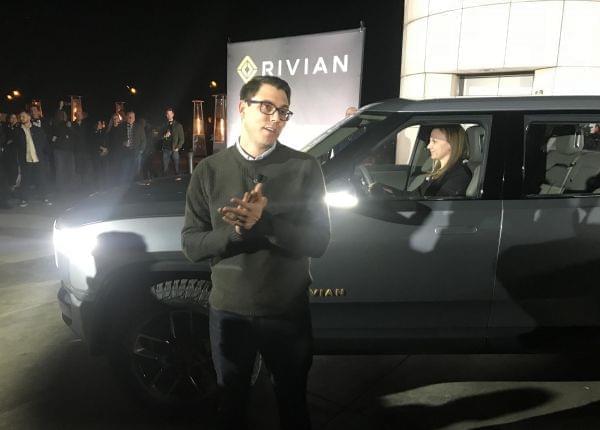Rivian At The LA Auto Show; Technology In The Classroom; Midwest Climate Change

Rivian founder and CEO RJ Scaringe speaks to the crowd Monday, Nov. 26, 2018, at the Griffith Observatory in Los Angeles. Behind him is the R1T pickup truck. Ryan Denham/WGLT
On the 21st: Bloomington-Normal residents have wondered what Rivian will do ever since the company first moved to the area. And recently, the startup unveiled their plans to make electric pickup trucks. We’ll learn more about that and the state of the auto industry in the Midwest. Plus, students of all ages are using more technology in the classrooms than ever before, whether it’s laptops, tablets, or other devices. So how do teachers make sure that technology is helpful instead of distracting? But first, we’ll sit down with state climatologist Jim Angel to talk climate change in Illinois.
15,000. That’s the number of jobs that will be lost in the U.S. and Canada thanks to General Motors’ decision to close down five of its plants.
Car sales in general are also down but right as all of this is happening, companies and manufacturers are in Los Angeles hoping to wow the public at the LA Auto Show.
One of those companies is Rivian. They’re an electric car startup from Michigan, but they’ve gotten some attention here in Illinois. They recently set up shop in Normal, where they plan to manufacture electric cars out of the former Mitsubishi plant in that community. This month they unveiled their first vehicles, which will be an electric pickup truck and an SUV.
Ryan Denham is a reporter with WGLT. He joined us from the LA Auto Show, where he’s reporting on Rivian. Joe White also joined us on the line from Detroit. He’s the Global Automotive Industry Editor with Reuters.
“That’s one of the fun and exciting challenges we had here. We don’t have history. We are a new brand. How do we create something that communicates our brand?”
— The 21st (@21stShow) November 28, 2018
- Jeff Hammoud, @Rivian’s VP for vehicle design.
More from @ryanWGLT: https://t.co/pBiKIizGmA
Plus-
Today tens of millions of students use connected devices like Chromebooks or iPads and millions more use online apps. In fact, more than 30 million K-12 students use web apps like Google Docs or Gmail. That’s according to the New York Times.
So how do educators make sure that they serve their purpose inside the classroom? Today we heard from two schools that approach this in very different ways. We also spoke with a researcher to find out what we know and don’t know about the effects of technology in schools.
Adam Geisen is an instructional tech coach and longtime high school English teacher at Triad Community Unit 2 in Troy in southern Illinois. Troy is about half an hour across the border from St. Louis. He helps train district teachers on how to use technology in the classrooms. Carol Triggiano currently teaches 7th grade Humanities at the Waldorf School in Chicago, where they have no devices in the classroom until high school. Both joined us on the line.
Ellen Wartella was also with us. She’s the professor and chair of Northwestern University’s Department of Communication and, she directs their center for Media and Human Development. Her research focuses on the effects of media and technology on kids.
.@AdamGeisen says technology improves engagement and challenges students to become creative thinkers.
— The 21st (@21stShow) November 28, 2018
“It’s not really about the technology, but what the kids are doing that matters,” he says.
But First-
You might have been busy shopping or enjoying time with family and friends after the Thanksgiving holiday, so maybe you missed a big report the government put out last Friday.
It was the fourth climate assessment survey. And it painted a picture of changing climate that means not just bad news for farmers in the form of higher temperatures, higher risk of droughts or flooding, but to anyone who suffers from asthma or other respiratory problems. And here in the Midwest, temperatures are projected to rise more than any other place in the country.
Jim Angel is the state’s climatologist. He wrote the Midwest chapter of the National Climate Assessment and he joined us in our Urbana studios.
"On average we're expected to warm by 4-5 degrees mid-century," says @JimAngel22. "We may see some pretty rapid increases in temperature in the next couple of decades."
— The 21st (@21stShow) November 28, 2018
Heat waves and hot days can be detrimental for crops, livestock and people he says.
